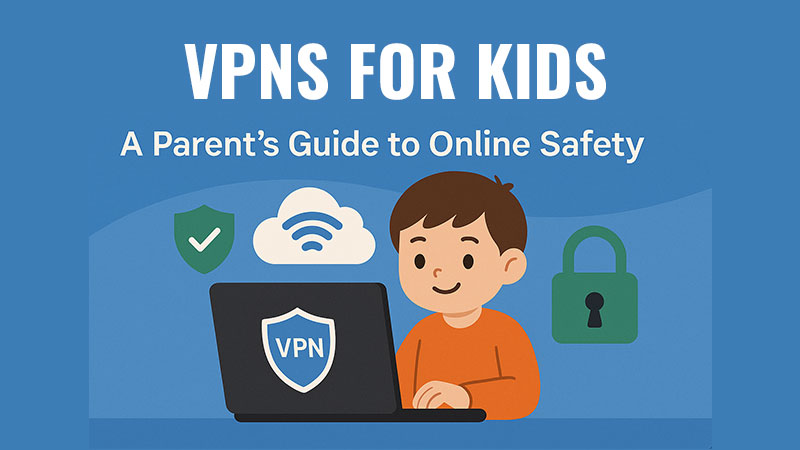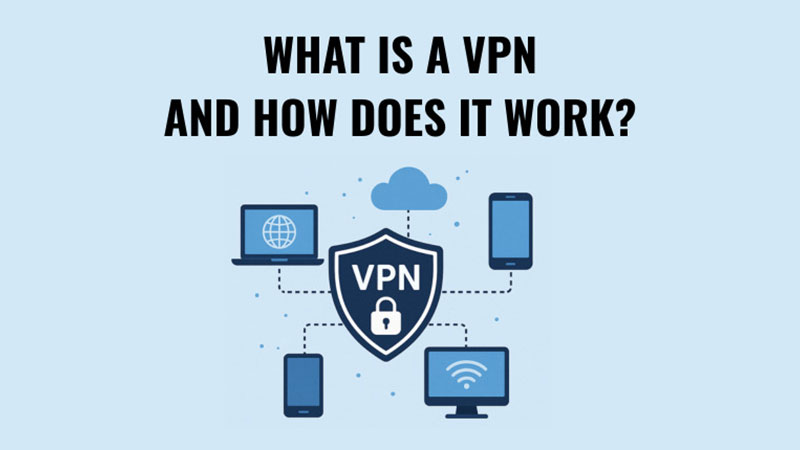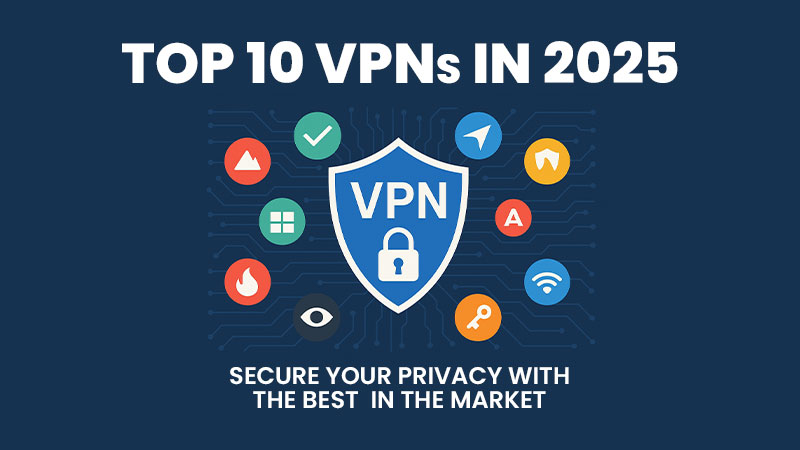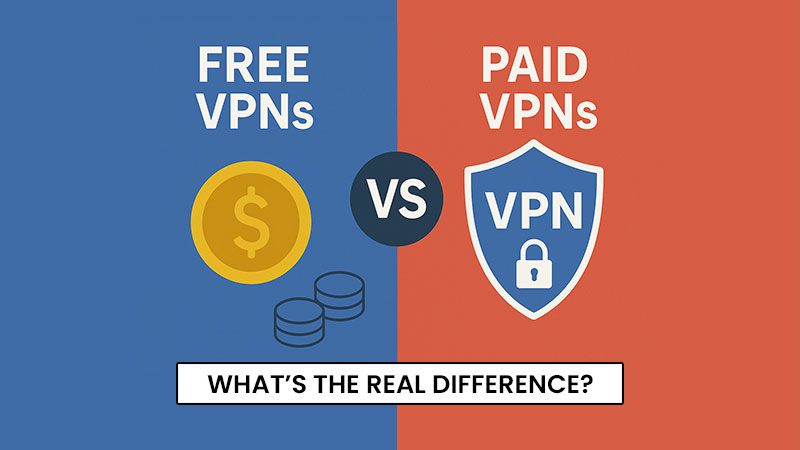Children are engaging with the internet at younger ages and across more devices than ever before. From online learning and gaming to social media and streaming, the internet offers immense benefits but it also brings serious risks. Parents are increasingly concerned about their children encountering inappropriate content, online predators, data tracking, and cyberbullying.Ensuring online safety for children has become a top priority, and one effective way to do that is by using VPNs for kids. A VPN, or Virtual Private Network, is a powerful tool that helps protect your child’s digital identity and privacy, making it an essential part of your family VPN guide.
Table of Contents
ToggleThis family VPN guide breaks down what VPNs are, how they protect your child’s digital footprint, and what to look for in a child-friendly VPN.
Understanding VPNs: A Simple Guide for Parents
A VPN (Virtual Private Network) is a powerful privacy tool that secures your internet connection by encrypting the data sent and received online. Think of it as a private, secure tunnel between your device and the internet. This encrypted tunnel ensures that your child’s online activity remains hidden from prying eyes—including hackers, data miners, advertisers, and even internet service providers.
When children go online without protection, their IP address and personal information can be easily tracked or exposed. By using a VPN for kids, you add a critical layer of defense that protects their identity and browsing habits. This is especially useful on public Wi-Fi networks, where risks of cyberattacks and unauthorized access are high.
A child-friendly VPN does more than just hide your child’s location—it helps prevent unwanted content, stops tracking cookies, and allows parents to apply filtering settings through integrated parental control VPN features. In short, a VPN is one of the smartest investments you can make for achieving better internet privacy for families and ensuring comprehensive online safety for children.
Why Every Child Should Use a VPN: Key Benefits for Online Safety

- 9.8
- The fastest and most reliable VPN on the market

- 9.5
- Low-cost VPN offering unrestricted device usage

- 8.2
- Affordable new VPN launched by top industry professionals
In the past, Virtual Private Networks (VPNs) were considered tools for business use or advanced internet users. But in 2025, the reality is different. With kids spending more time online for school, games, and social media, ensuring their safety has become increasingly complex. This is why VPNs for kids have become a must-have for any modern digital household.
A VPN is more than just a privacy tool — it’s a digital safety net that shields your child from many online risks. Whether your child is watching YouTube videos, chatting on apps, or researching for homework, a child-friendly VPN ensures that their personal data remains secure and their browsing behavior stays private.
Here’s why integrating a parental control VPN into your child’s devices is essential:
- Protection on Public Wi-Fi: Children often use unsecured public networks at schools, libraries, airports, or cafes. A VPN encrypts their connection, shielding them from potential hackers and data breaches.
- Improved Online Privacy: VPNs mask your child’s IP address and block trackers, making it harder for companies, websites, or online predators to monitor their activity.
- Safer Online Experience: Many top-rated VPNs include ad-blockers and malware protection, helping kids avoid inappropriate content and phishing attempts.
- Smart Content Filtering: With built-in parental control VPN settings, you can limit access to adult or harmful websites, adding an extra layer of online safety for children.
- Enhanced Location Privacy: VPNs hide your child’s real location, which is crucial for preventing location-based tracking and maintaining internet privacy for families.
In short, a VPN isn’t just an optional tool, it’s a proactive way to protect kids online and ensure a safer digital experience for your entire household.
Key Features to Consider When Choosing the Best VPN for Kids
When selecting the best VPN for kids 2025, it’s vital to focus on features that enhance both security and usability for young users. A reliable child-friendly VPN should offer more than just encryption—it should empower parents with control while ensuring children stay safe from harmful content, data breaches, and online predators. Here are the most important features to consider when choosing a parental control VPN for your family:
- Military-Grade Encryption: Choose a VPN that uses AES-256-bit encryption, the gold standard in online security. This ensures your child’s data remains private, even on public Wi-Fi networks.
- Automatic Kill Switch: This crucial feature automatically disconnects internet access if the VPN connection drops. It prevents any accidental exposure of your child’s real IP address or personal information.
- Integrated Parental Controls: Look for a VPN that includes robust filtering and monitoring options, allowing you to block inappropriate content and set browsing limits for different age groups.
- Strict No-Logs Policy: To guarantee internet privacy for families, select a VPN provider that does not collect or store any user activity logs. This protects your child’s data from being sold or exposed.
- User-Friendly Interface: The VPN should be intuitive and easy to use for both parents and children. A clean dashboard with simple controls makes setup and monitoring less stressful.
- Multi-Platform Support: A family-friendly VPN should cover all your household devices—laptops, tablets, smartphones, and even smart TVs—under a single subscription.
- Ad and Malware Blocking: Built-in tools that block ads, trackers, and malicious websites provide an added layer of protection, making the internet safer for kids to navigate.
By prioritizing these features, you ensure that your chosen VPN will effectively protect kids online, give you peace of mind, and offer a seamless experience for the entire family.
Are VPNs Legal and Safe for Kids to Use?
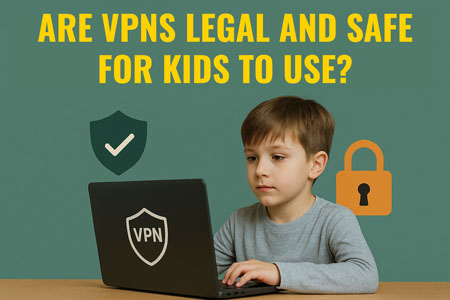
One of the most common questions from concerned parents is, “Are VPNs even legal and safe for my child to use?” The short answer is yes VPNs for kids are legal in most countries and can be incredibly safe when used responsibly and with the right provider.
While VPNs are widely used by professionals and travelers, they are perfectly legal for minors in regions where VPN usage is permitted (which includes most of North America and Europe). However, it’s important for parents to understand the potential risks associated with choosing the wrong service.
Using a free or unverified VPN can actually do more harm than good. Many free services make money by logging and selling user data, showing ads, or failing to offer robust encryption. That’s why choosing a premium, child-friendly VPN with strong privacy policies is essential for maintaining internet privacy for families.
When used effectively, a parental control VPN can:
- Provide comprehensive encryption and enforce a strict zero-logs policy.
- Allow for monitoring and filtering to ensure a safe browsing experience
- Block malicious websites, trackers, and harmful content automatically
As part of your family VPN guide, it’s crucial to read user reviews, inspect each VPN provider’s privacy policies, and look for certifications or transparency reports.
In summary, VPNs are both legal and safe for children—as long as parents are involved in selecting and setting up the service. Used properly, they serve as a reliable tool to protect kids online and support long-term online safety for children.
Best VPNs for Kids in 2025
With the growing demand for child-safe internet solutions, many VPN providers are now offering features specifically tailored to families. Choosing the best VPN for kids 2025 involves evaluating security, ease of use, parental controls, and affordability. Below are some of the top-rated options that strike the right balance between performance and online safety for children:
- NordVPN –NordVPN excels with lightning-fast servers, strong AES-256 encryption, and advanced parental control tools. Its easy-to-use interface and integrated malware protection make it a leading choice for families focused on keeping kids safe online.
- Surfshark – An affordable choice packed with features, Surfshark’s CleanWeb technology blocks ads, trackers, and harmful links. With support for unlimited devices, it’s a smart pick for large families prioritizing online privacy.
- ExpressVPN – Known for blazing-fast speeds and a rock-solid no-logs policy, ExpressVPN is perfect for streaming and schoolwork alike. While it lacks built-in parental controls, its robust privacy framework offers solid protection for older kids.
- CyberGhost – With specialized servers for streaming, browsing, and privacy, CyberGhost is incredibly beginner-friendly. It also includes smart rules and filtering options, which are helpful in a family VPN guide setting.
- Windscribe – Offers both free and paid plans, making it an accessible option for families on a budget. It includes built-in ad blockers and a strict privacy policy, and supports content filtering to enhance online safety for children.
Each of these VPNs provides unique benefits, so the best choice depends on your specific needs—whether it’s budget, speed, or enhanced control. Whichever you choose, integrating a child-friendly VPN into your home is a smart step toward a safer, more private digital environment for your children.
Tips for Parents: Teaching Kids Online Safety
A secure VPN is a powerful start—but building strong online habits is just as critical to protect kids online. Teaching your child how to be smart and cautious on the web will help ensure their safety long after the VPN is turned off. Here are essential tips every parent should follow to promote online safety for children and boost internet privacy for families:
- Start with Open Conversations: Make online safety an ongoing discussion. Explain what personal information is, why it shouldn’t be shared, and the risks of interacting with strangers online. Let your kids know they can come to you if something doesn’t feel right.
- Set Clear Rules and Boundaries: Establish household guidelines around screen time, acceptable websites, and app usage. Using a parental control VPN can help you enforce these boundaries digitally.
- Create a Supervised Online Environment: Encourage kids to use devices in shared spaces like the living room or kitchen. This allows you to observe their activities and step in when needed.
- Teach Good Digital Hygiene: Instill habits like using strong passwords, enabling two-factor authentication, and logging out of accounts when finished. Kids should also know to ignore suspicious links and pop-ups.
- Regularly Review Devices Together: Sit down with your child to check browser histories, app installations, and privacy settings. Show them how to recognize unsafe apps or overly invasive permissions.
- Encourage Critical Thinking: Help children recognize phishing scams, fake profiles, and clickbait headlines. Empower them to question what they see and not take everything at face value.
- Lead by Example: Kids take their cues from you—so lead by example. Use a VPN, manage your screen time, and stay up to date with the latest in digital safety.
By combining the technical protection of a child-friendly VPN with hands-on parenting and education, you create a safe, well-rounded foundation for your child’s digital journey. These proactive steps form the core of any effective family VPN guide and help your children grow into savvy, responsible internet users.
Conclusion: Is a VPN Right for Your Family?
As the digital world continues to grow more complex, a VPN for kids is becoming less of a luxury and more of a necessity. With children spending increasing amounts of time online—whether for learning, gaming, or social interaction—parents need tools that do more than just block explicit content. A child-friendly VPN offers holistic protection: shielding your child’s personal information, securing public Wi-Fi use, and supporting safe browsing habits.
But a VPN is just one part of the broader effort to ensure online safety for children. While it encrypts traffic and hides IP addresses, it’s most powerful when combined with other protective measures—like active parental involvement, open communication, and smart digital education.
So, is a VPN right for your family? If you value internet privacy for families, want better control over your child’s online environment, and are looking for ways to protect kids online without limiting their freedom to learn and explore—then the answer is a definite yes. By selecting the best VPN for kids 2025 and using it alongside proactive parenting strategies, you’ll be building a safe, secure, and empowering digital foundation for your children.
In short, adopting a parental control VPN is a simple yet impactful step in your journey to digital peace of mind. It’s more than a tool—it’s a commitment to smarter, safer internet use for the whole family.
Frequently Asked Questions (FAQ)
At what age should my child start using a VPN?
A child can start using a VPN as soon as they begin browsing the internet independently—often around age 7–10. The key is choosing a VPN with parental controls and monitoring features suitable for younger users.
Can a VPN block inappropriate websites automatically?
Some child-friendly VPNs come with integrated filtering tools or can be paired with parental control software to block explicit content, gambling sites, and other unsafe material.
Are free VPNs safe for kids?
Generally, no. Most free VPNs lack strong encryption, log user data, or display ads that may not be appropriate for children. Opt for trusted, paid VPNs that prioritize internet privacy for families.
Will a VPN slow down my child’s internet speed?
A small drop in speed can occur, but the best VPN for kids 2025 are optimized to deliver fast, stable connections suitable for streaming, gaming, and online classes.
Can I monitor what my child does online with a VPN?
Yes, if you choose a parental control VPN that includes monitoring tools. However, VPNs prioritize privacy, so you’ll need to balance security with your child’s right to digital independence.

